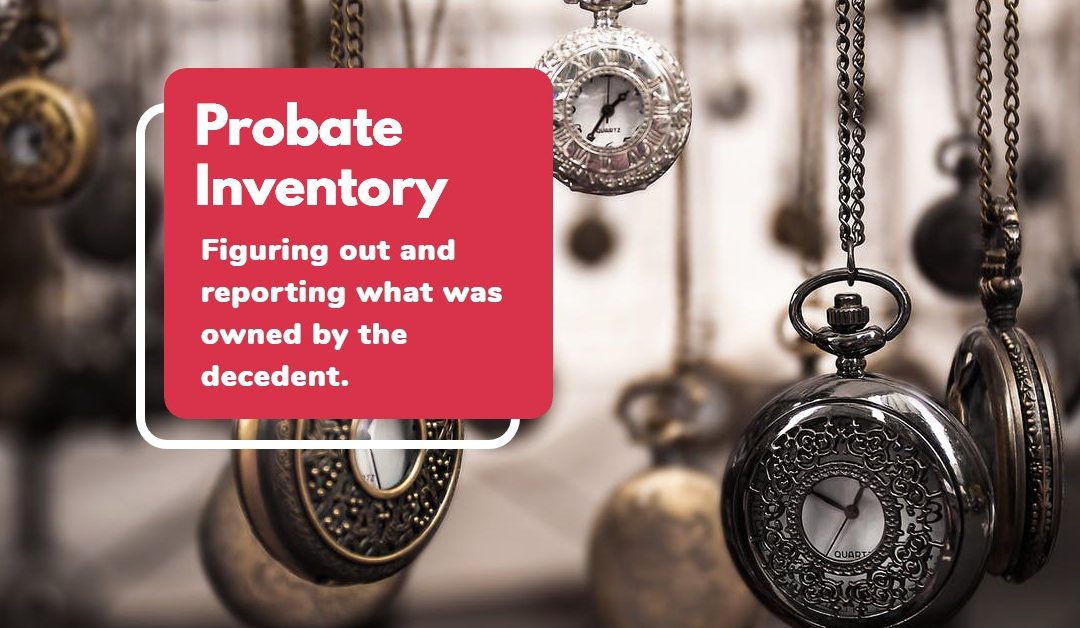Three months after an estate has been opened, the Court will require a Probate Inventory to be submitted.
The Inventory is a precise list of estate assets. To figure out what the assets are, you will need to figure out what the decedent owned at the time of their death.
As the executor or administrator of the estate, it is your legal responsibility to take care of the assets until they are distributed to the rightful heirs.
As the executor or administrator, it is a good idea to conduct an inventory on your own as soon as possible after the death of your loved one, so you will know what you are dealing with. However, it is not technically required until month three of the probate proceedings.
Locating Probate Inventory Assets
To begin, you will have to locate the assets. This can be done by going through the decedent’s desks, drawers, filing cabinets, and other places that essential documents may have been stored. Be on the lookout for vehicle titles or registrations and deeds. Financial assets, such as bank accounts, stocks, and insurance policies, may be evidenced by monthly or quarterly statements. Keep in mind that older individuals may have hidden cash in not-so-obvious places, such as under the mattress or in shoeboxes.
Safe Deposit Boxes
Many people choose to store their important documents in a safe deposit box. Safe deposit boxes cannot be accessed until the executor or administrator has been granted authority to do so by the Court. This authority will be given in the form of “Letters of Testamentary” or “Letters of Administration.” If you find that the decedent did have a safe deposit box, you’ll need to make arrangements with the bank to gain access. Then, you will need to sort through the contents. Any valuable asset found in a safe deposit box should be reported on the inventory.
There may even be assets that the decedent did not know about. Millions of dollars remain unclaimed (which means left inactive for at least three years.) The simplest way to track down unclaimed funds is to perform a search on
nccash.com. If you find that the decedent is in fact entitled to funds, you will be able to submit a claim form to obtain access to them.
via GIPHY
Completing the Probate Inventory Form
The Inventory form, which can be found on
nccourts.gov, is a two-page document. It is imperative to be completely truthful and accurate when completing the form. Both real and personal property will need to be reported. When valuing the property, it is crucial to use the values as of the decedent’s date of death.
Bank Accounts
There are several places in which bank accounts can be listed. For this reason, you must figure out how the account was owned. For example, if the account were only in the name of the decedent, the information would be placed on Page 1, Number 1. However, if the account(s) were joint accounts or were payable on death, the value would be listed elsewhere. To accurately report the value of an account, you will need bank statements that include the balance as of the date of death. The Court will also require signature cards to show proof of ownership. This can be acquired by visiting the bank.
Stocks and Bonds
There are two places in which stocks and bonds can be listed – those jointly owned without the right of survivorship or in the sole name of the decedent, and those jointly owned with right of survivorship. For this reason, you must figure out how the account was registered and report them as such. You will also need to know how many shares the decedent owned, the value of each share as of the date of death, and what company or corporation issued them. The Court will require proof of ownership and proof of value.
Cash and undeposited checks: If the decedent was in possession of cash or checks that had not been deposited, you would need to report that on the inventory.
All Other Personal Property
Items such as household furnishings, vehicles, jewelry, and other tangible items of value should also be reported. For household furnishings and jewelry, a good rule of thumb is to either get an appraisal or make a reasonable faith estimate of the value. Run-of-the-mill vehicles can be valued by using the Kelley Blue Book (kbb.com.) Antique vehicles may need an appraisal. Keep in mind that the Court requires you to pay a percentage of the value of the estate assets as the filing fee for the inventory, so be careful not to over-value tangible items of property.
Real Estate
In North Carolina, real property passes outside of the estate, unless otherwise directed by the decedent’s Last Will & Testament. However, any real property that the decedent may have owned will still need to be reported on the inventory. This is required in case the decedent has creditor claims that exceed the value of the estate property. In an event such as this, the real property may need to be sold to pay the creditor claims. The best way to value real property is to report the tax value of such property.
Interest in Companies/Corporations
If the decedent owned an interest in a company or corporation, it is best to consult an attorney to ensure the interest is valued correctly and reported.
Life Insurance
If the decedent had a life insurance policy that did not list beneficiaries, the policy value will be estate property and should be reported on the inventory. If their life insurance policy did list beneficiaries, the value does not need to be reported, but there is a place on the inventory to report that beneficiaries will be receiving funds.
Completing the inventory and other required Court forms can be daunting tasks. If you are the executor or administrator of an estate and have questions or concerns about filling out the inventory or another required Court document, contact one of our accomplished probate attorneys today. We can assist with probate issues as they arise to ensure that you, as the executor or administrator, are not held liable for any wrongdoing.
Contact us.


